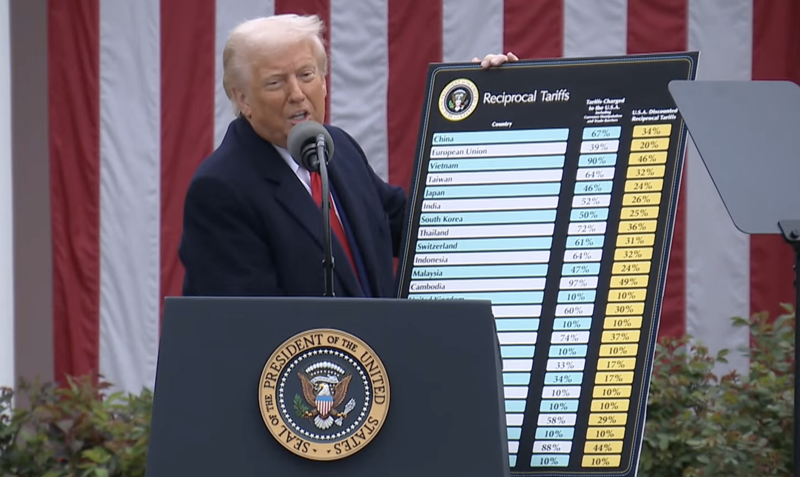U.S. markets took their steepest dive Thursday since the pandemic hit in March 2020 as investors worry about how the U.S. economy will handle President Donald Trump’s latest tariffs.
The Dow industrials dropped 1,679 points, or 4%. The tech-focused Nasdaq slumped 6%. The S&P 500 fell 4.8%. The dollar slipped to its lowest level of the year. It was the sharpest one-day decline since March 2020, when many states shut down large parts of the U.S. economy to slow the spread of COVID-19.
U.S. markets plummeted after Trump’s “Liberation Day” for U.S. trade on Wednesday, when he announced a 10% baseline tariff on all countries that will take effect Saturday. Trump also put higher individualized reciprocal tariffs on the countries with which the United States has the largest trade deficits, including China, India and Vietnam, among others.
Stocks lost about $3.1 trillion in market value.
“I think it’s going very well,” Trump said Thursday before flying to his Miami golf club for a charity event. “It was an operation like when a patient gets operated on and it’s a big thing. I said this would exactly be the way it is.”
Trump also said the tariffs will generate $6 trillion to $7 trillion in revenue. He said the jobs and manufacturing operations the tariffs will generate will swing stocks back the other way.
“The markets are going to boom, the stock is going to boom, the country is going to boom,” the president said. “And the rest of the world wants to see if there’s any way they can make a deal.”
Trump’s comments came after business groups warned of higher prices for U.S. consumers and other nations prepared to respond to what could be the opening salvo in a global trade war.
Trump’s comments largely echoed those of cabinet members who made TV appearances earlier in the day.
Vice President J.D. Vance said the goal was to stop losing American jobs. Previous trade policies, he said, rewarded companies for moving production to lower-cost markets.
“We’re going to make it harder to ship American jobs overseas,” he said. “It’s a total shift in the way that we’ve done economic policy.”
U.S. Secretary of Commerce Howard Lutnick called Trump’s tariffs an overhaul of world trade.
“This is the reordering of fair trade,” he said.
Trump and the White House have previously said they aren’t worried about Wall Street.
“The President wants to ensure that all Americans make out well, particularly Main Street – that’s the focus of these tariffs,” White House press secretary Karoline Leavitt said Tuesday. “But as I’ve said repeatedly, just like they were in his first term, Wall Street will be just fine.”
Trump’s trade moves on Wednesday marked the most significant shift in U.S. trade policy since the end of World War II. In a speech from the White House’s Rose Garden, Trump said foreign nations for decades have stolen American jobs, factories and industries. He said the tariffs would bring in new jobs, factories and industries and return the U.S. to a manufacturing superpower.
“Our country and its taxpayers have been ripped off for more than 50 years,” Trump said. “But it is not going to happen anymore.”
Not all Republicans were cheering on Thursday with the markets deep in the red.
U.S. Sen. Mitch McConnell, R-Ky., said tariffs will make goods more expensive for American families.
“As I have always warned, tariffs are bad policy, and trade wars with our partners hurt working people most,” he said. “Tariffs drive up the cost of goods and services. They are a tax on everyday working Americans.”
Trump will impose a 10% tariff on all countries on April 5.
“These tariffs will remain in effect until such a time as President Trump determines that the threat posed by the trade deficit and underlying nonreciprocal treatment is satisfied, resolved, or mitigated,” according to a White House fact sheet.
Trump’s executive order also gives him authority to increase the tariffs “if trading partners retaliate” or “decrease the tariffs if trading partners take significant steps to remedy non-reciprocal trade arrangements and align with the United States on economic and national security matters,” according to the White House.







